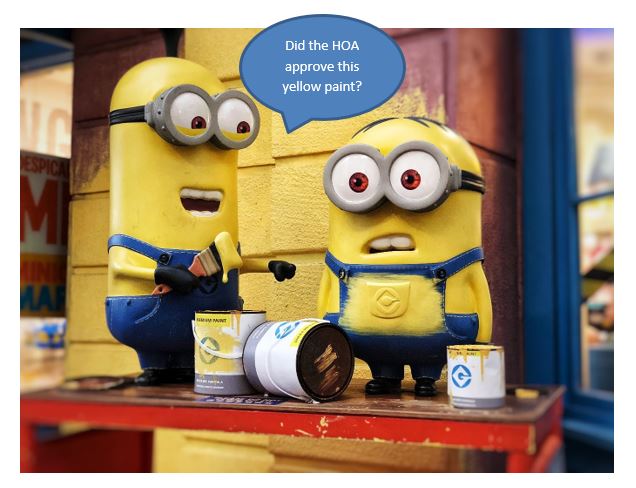Let’s face it—there are just certain things in this world with which we have a love-hate relationship. Some of the most maligned professionals in the country are lawyers, but when you need one, he becomes your best friend. Or insurance—we hate to pay those premiums, but you are glad we did after that uninsured driver rear-ends you. Or how about law enforcement? Nobody likes them when those red-and-blue lights are flashing in the rear-view mirror, but boy are we glad to know they are there when trouble comes knocking. And so it is with another infamous institution—the Home Owners’ Association or HOA.

Like many who live in a community governed by an HOA, I have experienced both the positives and the negatives of that relationship. It was the two sides of that coin that in fact led me to run for and win a position on my own HOA Board. I’m a busy professional and an active volunteer in my community, so one two-year term on the board was all that I could afford to spare, but it was enough to give me an inside perspective to the outside one that I already had as a homeowner. What I would like everyone to understand is:
- Why we sometimes hate our HOA’s
- The duties and benefits of the HOA
- What you can do to get the most from your HOA
So why the ill feelings toward our HOA’s? Well first is the anxiety brought on by horror stories we hear in the media. We hear of the oppressive and sometimes irrational acts of out-of-control HOA’s that are corrupted by power and we fear that we could be victims of the same. Or perhaps it is when we get a letter because we violated a deed restriction such as leaving a trash can out, having an overgrown lawn, having a non-running vehicle in the driveway or we never took our Christmas lights down and now it’s March. Now we are just ticked, right? Perhaps you mow your front yard every week for 10 years and you miss one week, and you get a stinking letter. Sometimes it can feel as if it is personal—that they are out to get us. Then there are the fees; it is never fun to write a check for the annual dues, which can run from a few hundred to thousands of dollars, depending on the community. And like insurance, we wonder if we are getting value from those dollars or if they are just going down the drain.
So, what exactly do we get for those dollars? The core responsibility of the HOA is the enforcement of deed restrictions and the maintenance of community areas such as parks, clubhouses, swimming pools and playgrounds. Obviously, the more amenities, the higher the dues.
The ultimate payoff though is in peace of mind, a more esthetic community and higher property/resale values. Drive around in different neighborhoods and you will be able to tell right away if a neighborhood /planned development has an HOA or not. Let me say, though, that there are some exceptions to this rule. For example, there is a very small neighborhood not far from me that has gorgeous homes and yards and that area is not governed by an HOA, though they do have some deed restrictions. It is a unique, well-kept area, but also the exception to the rule which is that the better neighborhoods have an HOA. More likely, is that neighborhoods without an HOA, and without restrictions, are going to be the ones that have junk and trash cans kept out front, cars parked in the yards, non-running vehicles out front and campers and boats stored out front and grass that is not being mowed. You feel uncomfortable driving though it and certainly don’t want to walk through the neighborhood. Guess which neighborhood is going to have homes with a higher value and higher resale value? That is right, the neighborhood with an HOA.
So, what can you do to ensure a positive HOA experience? First, know and follow your deed restrictions. Follow that guideline and chances are that you will never have a run-in with your HOA—in almost every case they are there to help you and definitely not out to get you. Next, attend at least one HOA meeting a year (more often if possible) so that you can meet the board members (they are after all your neighbors) and see that they do truly have the best interest of the community in mind. Get to know the board members who work hard keeping up with the common areas/amenities, by-laws, maintenance, safety and security for your neighborhood and ask what you can do volunteer-wise to help out (volunteering to serve on committees will give you a much better sense of community). Attending a meeting occasionally will also give you a feel for what issues are facing the community and for improvements that may be coming.
And if you are not satisfied with how your HOA is run, then run for a board position like I did and get involved in helping out your local neighborhood!
When you understand that the HOA is there to protect your neighborhood and your property values, I am sure you will rest much easier knowing that they are there.